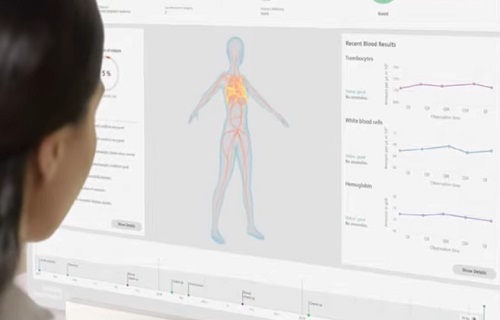Many vital events in our body such as growth, sleep and awakening, nutrition and reproduction are triggered by hormones. The harmonious and correct functioning of hormones is necessary for growth and a healthy life. The pituitary gland is very vital as it is the place where all these hormonal activities are coordinated and many hormones are produced. It is worth noting that the pituitary gland is also known as the “master gland” because it controls the function of several other endocrine glands in the body, including the thyroid gland, the adrenal gland, and the gonads (testes and ovaries). Dysfunction of the pituitary gland can lead to a range of health problems, including growth disorders, hormonal imbalances, and fertility problems. Therefore, it is important to maintain the health of the pituitary gland in order to maintain overall health and well-being.

What is Anterior Pituitary
The anterior pituitary, also known as the adenohypophysis, is the front part of the pituitary gland. It is made up of glandular tissue and is responsible for producing several hormones that regulate various bodily functions.
The hormones produced by the anterior pituitary include:
- Growth hormone (GH): This hormone regulates growth and development, as well as metabolism.
- Adrenocorticotropic hormone (ACTH): This hormone stimulates the production of corticosteroids by the adrenal gland, which helps to regulate the body’s stress response.
- Thyroid-stimulating hormone (TSH): This hormone regulates the production and secretion of thyroid hormones, which play a role in metabolism, heart rate, and body temperature.
- Follicle-stimulating hormone (FSH) and luteinizing hormone (LH): These hormones regulate the menstrual cycle and fertility in women, and the production of testosterone in men.
- Prolactin: This hormone stimulates milk production in the breasts during lactation.
The anterior pituitary is regulated by hormones produced by the hypothalamus, a region of the brain located just above the pituitary gland. The hypothalamus produces releasing hormones that stimulate the production and secretion of hormones by the anterior pituitary, and it also produces inhibiting hormones that inhibit hormone production.
For Help Anterior Pituitary
The anterior pituitary is a gland located in the brain that plays a key role in regulating various functions in the body. Some ways to support the health of the anterior pituitary gland include:
- Getting enough sleep: Adequate sleep is important for overall health and can help to support the functioning of the anterior pituitary gland.
- Reducing stress: Chronic stress can have negative effects on the body, including the anterior pituitary gland. Engaging in stress-reducing activities, such as exercise, meditation, and yoga, can help to support the health of the gland.
- Eating a healthy diet: A well-balanced diet that is rich in fruits, vegetables, and other nutrients can help to support the health of the anterior pituitary gland.
- Avoiding alcohol and tobacco: Excessive consumption of alcohol and tobacco can have negative effects on the health of the anterior pituitary gland and other organs in the body.
- Exercising regularly: Regular physical activity can help to support the health of the anterior pituitary gland and the body as a whole.
It’s important to note that the anterior pituitary gland can be affected by a variety of factors, and it is always best to consult a healthcare professional for specific recommendations related to your individual health needs.
Risk Factors For Anterior Pituitary
There are several factors that may increase the risk of developing problems with the anterior pituitary gland, including:
- Age: The risk of developing problems with the anterior pituitary gland may increase with age.
- Chronic stress: Chronic stress can have negative effects on the body, including the anterior pituitary gland.
- Poor diet: A diet that is lacking in essential nutrients may increase the risk of developing problems with the anterior pituitary gland.
- Alcohol and tobacco use: Excessive consumption of alcohol and tobacco may increase the risk of developing problems with the anterior pituitary gland.
- Lack of physical activity: A sedentary lifestyle may increase the risk of developing problems with the anterior pituitary gland and other health problems.
It’s important to note that the anterior pituitary gland can be affected by a variety of factors, and it is always best to consult a healthcare professional for specific recommendations related to your individual health needs.

Treatment Anterior Pituitary
Treatment for problems with the anterior pituitary gland will depend on the specific condition causing the problem. The anterior pituitary gland is a gland located in the brain that plays a key role in regulating various functions in the body. Some common problems that can affect the anterior pituitary gland include:
- Pituitary adenoma: A pituitary adenoma is a noncancerous tumor that develops in the pituitary gland. Treatment may include medications, radiation therapy, or surgery to remove the tumor.
- Hypopituitarism: Hypopituitarism is a condition in which the pituitary gland does not produce enough hormones. Treatment may include hormone replacement therapy.
- Hyperpituitarism: Hyperpituitarism is a condition in which the pituitary gland produces too much of one or more hormones. Treatment may include medications to inhibit hormone production or surgery to remove the gland.
It is important to consult a healthcare professional for proper evaluation and treatment of problems with the anterior pituitary gland. The specific treatment plan will depend on the underlying cause of the problem and the individual’s specific health needs.
What is Thyrotropin ?
Thyrotropin, also known as thyroid-stimulating hormone (TSH), is a hormone produced by the pituitary gland that plays a key role in the regulation of the thyroid gland. The thyroid gland is a butterfly-shaped gland located in the neck that produces hormones that help to regulate the body’s metabolism.
Thyrotropin acts on the thyroid gland to stimulate the production and release of thyroid hormones, which help to regulate the body’s metabolism. When the body’s metabolism is too slow, the pituitary gland releases more thyrotropin, which stimulates the thyroid gland to produce and release more thyroid hormones. When the body’s metabolism is too fast, the pituitary gland releases less thyrotropin, which reduces the production and release of thyroid hormones.
Thyrotropin levels in the body are typically measured through a blood test. Abnormal levels of thyrotropin can be an indication of problems with the thyroid gland or the pituitary gland. It is important to consult a healthcare professional for proper evaluation and treatment of abnormal thyrotropin levels.

Treatment Anterior Thyrotropin
Abnormal levels of thyrotropin in the body can have various effects on the body, depending on whether the levels are too high or too low.
If thyrotropin levels are too high, it can indicate an underactive thyroid gland (hypothyroidism), which can cause symptoms such as fatigue, weight gain, dry skin, and hair loss.
If thyrotropin levels are too low, it can indicate an overactive thyroid gland (hyperthyroidism), which can cause symptoms such as tremors, rapid heartbeat, weight loss, and anxiety.
It is important to consult a healthcare professional for proper evaluation and treatment of abnormal thyrotropin levels.
If thyrotropin levels are too high, it can indicate an underactive thyroid gland (hypothyroidism), which can be treated with medications called thyroid hormone replacement therapy. These medications contain thyroid hormones that help to regulate the body’s metabolism.
If thyrotropin levels are too low, it can indicate an overactive thyroid gland (hyperthyroidism), which can be treated with medications that inhibit the production of thyroid hormones or with surgery to remove the thyroid gland.
It is important to consult a healthcare professional for proper evaluation and treatment of abnormal thyrotropin levels. The specific treatment plan will depend on the underlying cause of the abnormal levels and the individual’s specific health needs.
What is Thyrogen
Thyrogen is a synthetic form of thyroid-stimulating hormone (TSH), a hormone produced by the pituitary gland that plays a key role in the regulation of the thyroid gland. Thyrogen is used to stimulate the thyroid gland to produce thyroid hormones as part of a medical procedure called a thyroid scan.
A thyroid scan is a diagnostic test that uses a small amount of radioactive material to produce images of the thyroid gland. Thyrogen is injected into the body a few days before the scan to stimulate the thyroid gland to take up the radioactive material, which makes it easier to visualize the gland on the scan.
Thyrogen is only available with a prescription and is typically administered by a healthcare professional. It is important to follow the instructions of a healthcare professional when using Thyrogen and to discuss any concerns or questions about the medication with them.
What is Side Effects of Thyrogen
Some common side effects of Thyrogen may include:
- Flushing: This may cause a warm, red sensation in the face and neck.
- Rash: A rash may appear on the skin.
- Headache: Some people may experience a headache after taking Thyrogen.
- Nausea: Some people may experience feelings of nausea or vomiting after taking Thyrogen.
- Fatigue: Some people may feel tired or weak after taking Thyrogen.
- Muscle or joint pain: Some people may experience muscle or joint pain after taking Thyrogen.
It is important to discuss any side effects with a healthcare professional. They can recommend ways to manage or alleviate these side effects. If you experience serious or unusual side effects after taking Thyrogen, it is important to contact a healthcare professional immediately.
Thyrogen treatment is typically administered by a healthcare professional in a medical setting. The specific treatment plan will depend on the individual’s specific health needs and the purpose of the thyroid scan.
It is important to follow the instructions of a healthcare professional when using Thyrogen and to discuss any concerns or questions about the medication with them. It is also important to inform the healthcare professional about any other medications you are taking, as Thyrogen may interact with certain drugs.




